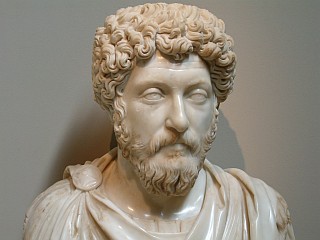Nonfiction for Entrepreneurs: Part Two

As famous as Marcus Aurelius was, there are,
surprisingly, no photographs of the guy.
Best Nonfiction for Entrepreneurs: Meditations by Marcus Aurelius
Another quick entry in our series detailing the best nonfiction books for entrepreneurs. This week, we look to antiquity for lessons from one of Rome's greatest leaders.
Marcus Aurelius Biography
Roman emperor. Economist. Philosopher. Character in the 2000 Russell Crowe movie, “The Gladiator”. Marcus Aurelius is one of history’s greatest figures. The last of the “Five Good Emperors” that took Rome to the height of its power, Aurelius helped guide his people through war, disease, and other disasters. He is remembered for his dedication to hard work, his fair and competent governance, and, perhaps most importantly, his writings on duty and service.
Meditations
A collection of 12 books originally written in Greek, Meditations is considered a literary milestone and one of the best examples of Stoic philosophy (a Greek philosophy that emphasizes reason and self-restraint). Leaders and academics have long held Meditations in the highest esteem, and for good reason. The work is simple and easy to understand while delving into complicated topics relating to perspective, service to others, and the nature of “good” and “bad”. Meditations has resonated with audiences for millennia (literally) with a recent translation hitting the New York Times bestseller list in 2002.
One of the major themes of the work relates to focus. Aurelius argues that “to be a good man”, one must remove distractions that interfere with maintaining strong principles. Or, to quote the man himself, “You have the power to strip away many superfluous troubles located wholly in your judgement, and to possess a large room for yourself embracing in thought the whole cosmos, to consider everlasting time, to think of the rapid change in the parts of each thing…”
Importance of Meditations for Entrepreneurs
Entrepreneurs and business owners can often narrow their thinking in order to get the job done. In fact, many people interpret the teachings in Meditations to justify a narrow worldview. Of course, this counters almost everything Aurelius was trying to teach. By accepting the world, and what happens in it, as neither “good” nor “bad”, one can move forward and act with greater clarity and limited emotion.
Aurelius understands this is going to be difficult. Obstacles will present themselves but, like many successful people, Aurelius sees this as a good thing. He writes, “The impediment to action advances action. What stands in the way becomes the way.” To put this another way, challenges improve the ability to overcome them. Obstacles are an expected (and necessary as Aurelius would argue) part of growth. How they are dealt with defines a leader and shapes the future of all they lead.

back to blog

As famous as Marcus Aurelius was, there are,
surprisingly, no photographs of the guy.
Best Nonfiction for Entrepreneurs: Meditations by Marcus Aurelius
Another quick entry in our series detailing the best nonfiction books for entrepreneurs. This week, we look to antiquity for lessons from one of Rome's greatest leaders.
Marcus Aurelius Biography
Roman emperor. Economist. Philosopher. Character in the 2000 Russell Crowe movie, “The Gladiator”. Marcus Aurelius is one of history’s greatest figures. The last of the “Five Good Emperors” that took Rome to the height of its power, Aurelius helped guide his people through war, disease, and other disasters. He is remembered for his dedication to hard work, his fair and competent governance, and, perhaps most importantly, his writings on duty and service.
Meditations
A collection of 12 books originally written in Greek, Meditations is considered a literary milestone and one of the best examples of Stoic philosophy (a Greek philosophy that emphasizes reason and self-restraint). Leaders and academics have long held Meditations in the highest esteem, and for good reason. The work is simple and easy to understand while delving into complicated topics relating to perspective, service to others, and the nature of “good” and “bad”. Meditations has resonated with audiences for millennia (literally) with a recent translation hitting the New York Times bestseller list in 2002.
One of the major themes of the work relates to focus. Aurelius argues that “to be a good man”, one must remove distractions that interfere with maintaining strong principles. Or, to quote the man himself, “You have the power to strip away many superfluous troubles located wholly in your judgement, and to possess a large room for yourself embracing in thought the whole cosmos, to consider everlasting time, to think of the rapid change in the parts of each thing…”
Importance of Meditations for Entrepreneurs
Entrepreneurs and business owners can often narrow their thinking in order to get the job done. In fact, many people interpret the teachings in Meditations to justify a narrow worldview. Of course, this counters almost everything Aurelius was trying to teach. By accepting the world, and what happens in it, as neither “good” nor “bad”, one can move forward and act with greater clarity and limited emotion.
Aurelius understands this is going to be difficult. Obstacles will present themselves but, like many successful people, Aurelius sees this as a good thing. He writes, “The impediment to action advances action. What stands in the way becomes the way.” To put this another way, challenges improve the ability to overcome them. Obstacles are an expected (and necessary as Aurelius would argue) part of growth. How they are dealt with defines a leader and shapes the future of all they lead.
@LemonadeDayNational






